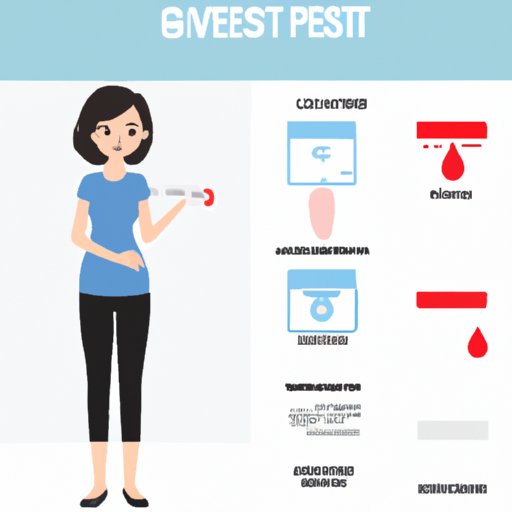Introduction
Pregnancy is defined as “the condition of carrying a developing embryo or fetus within the female body” (Oxford Languages). If you think you may be pregnant, it is important to confirm this with a medical professional. This article will explore different ways of detecting pregnancy, from taking a pregnancy test to monitoring physical changes in your body.
Take a Pregnancy Test
A pregnancy test is one of the most common ways to determine if someone is pregnant. Pregnancy tests work by detecting the presence of a hormone called human chorionic gonadotropin (hCG) in the urine. hCG is produced by the placenta shortly after the fertilized egg implants into the uterus wall. Home pregnancy tests are usually over 99% accurate when taken correctly, according to a study published in The Lancet.
To take a home pregnancy test, you should follow the instructions on the package. Generally, you will need to pee on a stick or dip it in your urine stream. Most home pregnancy tests will give you results in a few minutes. There are also digital tests available that can give you a more precise reading.
There are several types of home pregnancy tests to choose from. These include urine strips, midstream tests, and digital tests. Urine strips are the most basic type of test, and they are usually the cheapest. Midstream tests are slightly more expensive, but they are easier to use because you can pee directly onto the stick. Digital tests are the most expensive option, but they are the most accurate and provide the clearest results.
Track Your Menstrual Cycle
Tracking your menstrual cycle is another way to determine if you are pregnant. A normal menstrual cycle typically lasts 28 days, although this can vary from person to person. The first day of your period is counted as day one of your cycle. During the first part of your cycle, your body produces hormones that cause the lining of your uterus to thicken. This is followed by ovulation, which usually occurs between days 11 and 21 of your cycle. After ovulation, the hormone progesterone is released, which helps prepare the uterus for implantation of a fertilized egg.
If you think you may be pregnant, it is important to track your menstrual cycle to determine if you have missed a period. A missed period is often one of the first signs of pregnancy. However, it is important to note that there are other reasons why a period might be missed, such as stress, illness, or changes in diet or exercise.

Look for Early Symptoms of Pregnancy
Another way to determine if you are pregnant is to look for early symptoms of pregnancy. Common early symptoms of pregnancy include nausea, fatigue, frequent urination, and breast tenderness. These symptoms usually start to appear around 4-6 weeks after conception. It is important to note that these symptoms can also be caused by other conditions, such as premenstrual syndrome or an underlying health issue, so they should not be used as an indicator of pregnancy.

Monitor Changes in Your Body
Physical changes in your body can also be a sign of pregnancy. As your body starts to produce more hormones, you may experience changes in your skin, hair, and nails. Your breasts may also become larger and feel tender. Weight gain is also common during pregnancy, as the baby needs nutrients to grow.
It is important to note that these changes can occur even if you are not pregnant. For example, some women experience weight gain or breast tenderness during their menstrual cycle. Therefore, it is important to consider other factors when determining if you are pregnant.

Consider Taking a Blood Test
Another way to confirm pregnancy is to take a blood test. A blood test measures the amount of hCG in your blood, which can help confirm or deny a pregnancy. Blood tests are usually more accurate than home pregnancy tests and can detect very low levels of hCG. However, they require a visit to a doctor’s office and are more expensive than home pregnancy tests.
Make an Appointment with a Healthcare Provider
If you think you may be pregnant, it is important to make an appointment with a healthcare provider. A healthcare provider can answer any questions you may have about pregnancy and provide advice on how to stay healthy. They can also order tests to confirm or deny a pregnancy. Some questions to ask your healthcare provider include: What kind of tests do I need? What steps should I take to ensure a healthy pregnancy? What lifestyle changes should I make?
Conclusion
In conclusion, there are several ways to determine if you are pregnant. These include taking a pregnancy test, tracking your menstrual cycle, looking for early symptoms of pregnancy, monitoring physical changes in your body, and considering taking a blood test. It is also important to make an appointment with a healthcare provider to discuss any concerns or questions you may have. If you think you may be pregnant, it is important to seek medical advice.
(Note: Is this article not meeting your expectations? Do you have knowledge or insights to share? Unlock new opportunities and expand your reach by joining our authors team. Click Registration to join us and share your expertise with our readers.)
